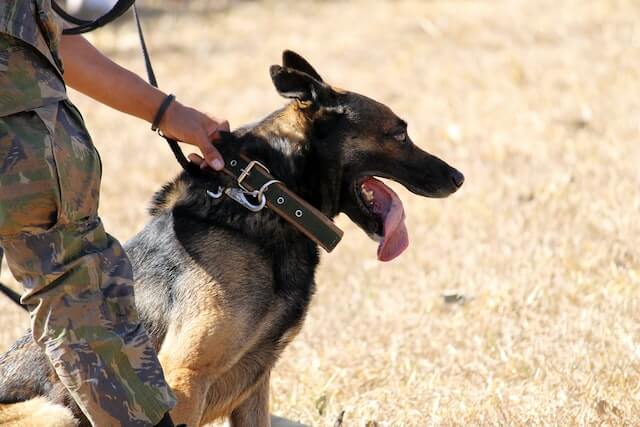
Most police dogs are not neutered. However, there still are a few police dogs today that are neutered for various medical and behavioral reasons, like maintaining their heat cycles.
This is more common among female dogs to keep them from attracting other male dogs and to prevent certain health issues too.
In other words, some departments choose to neuter their police dogs to prevent any potential aggressive behavior, while others leave them intact to maintain their natural instincts.
Therefore, the decision to neuter a police dog is up to the department and the specific dog’s circumstances.
Why Are Police Dogs Not Neutered?
It is not common for police dogs to be neutered, as neutering can lead to undesirable results. A neutered dog tends to be more aggressive than dogs that are not neutered.
In addition to that, a neutered dog can also show many signs of restlessness and display different forms of negative behavior. It is possible that neutering a police dog could negatively affect their abilities and performance.
In fact, neutering a dog is also known to affect testosterone levels in dogs, resulting in hormonal changes, as well as energy levels that have been shown to be harmful.
These factors are important considerations in the selection and training of police dogs, and neutering could potentially compromise their suitability for the job.
And it is for these reasons that neutering is not common among police dogs that we find today.
Must Read: Do police dogs get paid? If yes, then how?
Are Neutered Dogs More Trainable?
No, there is no difference between a neutered and a non-neutered dog when it comes to trainability. There is a common misconception that neutered dogs are easier to train, but the reality is a bit different.
Neutering can affect a dog’s hormone levels and potentially alter their behavior, but this does not necessarily mean that they are more or less trainable. Instead, a reward-based approach tends to be more effective at solving problems than neutering based on instinct.
Neutering a dog can, in fact, prove to be more problematic than helpful, bringing with it a host of cons that we shall go on to see in the course of this article.
Does Neutering Affect the Performance of a Police Dog?

Yes, it does affect the performance of a police dog, but it need not be in a positive way. Sometimes, neutering a police dog can have more of a negative effect on a dog. Neutering is shown to have many adverse effects on a dog’s response to training, bringing about a host of unwanted and undesirable behaviors not expected from a police dog.
Neutered dogs have shown to be more underconfident in the long run, and this should not be surprising, should it?
A neutered dog is denied his ability to discover and enjoy his surroundings to the fullest, and this can, over time, have some adverse effects on his growth and training.
Benefits of Neutering Police Dogs
Neutered police dogs have lesser chances of testicular cancer and other prostate diseases. Some studies even say that a neutered dog can enjoy a longer lifespan.
They are also less likely to roam around and fight and could, thus, in a way, display comparatively good behavior. There will be fewer bites from his side, and accidents that are a result of the mischief dogs go about all the while.
As the female dogs will not be displaying heat cycles, they will not be attracting male dogs to produce their litter all over the place.
Also, female dogs that are neutered are less likely to face mammary gland tumors and ovarian cancer, and this is another benefit of neutering in females.
Drawbacks of Neutering Police Dogs
While the process of neutering is generally painless, don’t be surprised to see a change in your dog’s attitude when he comes home. Dogs have feelings too. Your neutered dog will soon show you symptoms of depression and anxiety.
At some point in time, a neutered dog may even cling to you, the one responsible for all it is now going through.
While the dog is not going to sit there plotting any revenge on you, the fact that its trust has been betrayed can indeed be painful.
Here’s the part you would never expect. Neutered dogs tend to become lazy and lethargic at some point in time, so the dog you took in to help you, can sometime in the future prove to be of no more use to you.
You Might Also Like: Can dogs breathe through their mouth?
The Neutering Controversy Among K-9 Units!

The decision to neuter police dogs is controversial, with differing opinions among K-9 units and experts.
Some argue that neutering can have certain benefits for the health and well-being of police dogs. As opposed to this, others believe it is unethical and could compromise their abilities and desire to work.
While the ethical implications of neutering police dogs, public opinion and legal regulations also play a role in the decision. The policies and practices of individual K-9 units often influence the decision to neuter police dogs.
The controversy surrounding the neutering of police dogs is a complex issue with many different factors to consider.
Final Thoughts
And that’s all about dog neutering. We hope you got your answer now and that we told you all that you wanted us to.
It’s true that the practice of neutering police dogs is a complex and controversial issue that has both supporters and opponents.
Although neutering may improve behavior and reduce aggression, it can also negatively impact a police dog’s physical and mental capabilities.
So, the decision to neuter a police dog is based on the individual needs and best interests of each animal. Also, remember that any surgical procedure carries risks and can change an animal positively or negatively.

